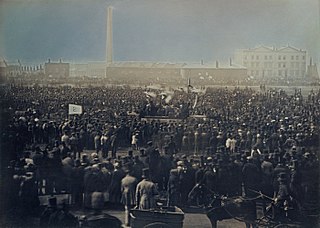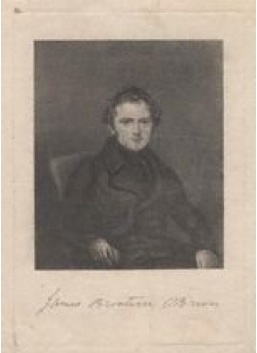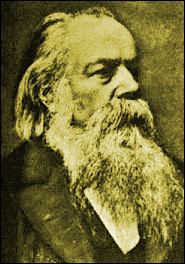John Cleave | |
|---|---|
| Born | 1790 |
| Died | 1847 |
| Nationality | British |
| Occupation(s) | Printer, newspaper publisher |
John Cleave (born circa 1790) was a British, London based Chartist leader, a printer and newspaper publisher.
Born of Irish stock, as a young boy John Cleave went to sea and is first documented for his political activities as late as 1828, in London, working to assist Henry Hetherington at the Civil & Religious Association.
A few years later in 1831 Cleave was a printer at Snow Hill in London then at Shoe Lane where he also operated a bookshop and coffee house alongside his printing business. Cleave was now working on The Poor Man's Guardian along with Henry Hetherington and James Watson.
In 1834 he felt ready to start his own newspaper Cleave's Weekly Police Gazette which as well as reporting on recent crimes also contained a political campaigning and reform element within its pages, a combination that was very successful, being sold to over 40,000 avid readers per week by 1836.
Cleave was refusing to pay stamp duty on his newspaper, in line with other radical publishers and pamphleteers, which of course brought him into conflict with the authorities who levied fines and wanted such seditious radicals imprisoned. It was the view of radical publishers that a free press was vital to social, political and moral improvement and that the government were oppressing the people's firmly held beliefs and rights to communicate. The law was gradually reformed and the fourpenny tax on newspapers was reduced to one-penny and pamphlets had their tax removed altogether.
Also in 1836 Cleave joined forces with William Lovett and Henry Hetherington to form the new London Working Men's Association. He was soon to be closely involved in the National Charter Association too, and was its first Treasurer. In 1837 Cleave accompanied Henry Vincent, a gifted younger orator and emerging Chartist leader, on a speaking tour of northern England where the two men initiated the establishment of Working Men's Associations in northern cities such as Leeds, Kingston upon Hull, and towns such as Bradford, Halifax and Huddersfield. The two men formed strong bonds during this time and Henry Vincent was later to marry Cleave's daughter Lucy in 1841.
In the 1840s as the National Charter Association divided over policy differences and the careers of the early leaders ran their differing courses Cleave sided with the moderate moral force Chartists alongside William Lovett and continued to work for universal suffrage and the complete removal of stamp duty from all newspapers until his death in 1847.

Chartism was a working-class movement for political reform in the United Kingdom that erupted from 1838 to 1857 and was strongest in 1839, 1842 and 1848. It took its name from the People's Charter of 1838 and was a national protest movement, with particular strongholds of support in Northern England, the East Midlands, the Staffordshire Potteries, the Black Country and the South Wales Valleys, where working people depended on single industries and were subject to wild swings in economic activity. Chartism was less strong in places, such as Bristol, that had more diversified economies. The movement was fiercely opposed by government authorities, who finally suppressed it.

Feargus Edward O'Connor was an Irish Chartist leader and advocate of the Land Plan, which sought to provide smallholdings for the labouring classes. A highly charismatic figure, O'Connor was admired for his energy and oratory, but was criticised for alleged egotism. His newspaper Northern Star (1837–1852) was widely read among workers, becoming the voice of the Chartist movement.
The Radicals were a loose parliamentary political grouping in Great Britain and Ireland in the early to mid-19th century who drew on earlier ideas of radicalism and helped to transform the Whigs into the Liberal Party.

The London Working Men's Association was an organisation established in London in 1836. It was one of the foundations of Chartism, advocating for universal male suffrage, equally-populated electoral districts, the abolition of property qualifications for MPs, annual Parliaments, the payment of MPs, and the establishment of secret ballot voting. The founders were William Lovett, Francis Place and Henry Hetherington. They appealed to skilled workers rather than the mass of unskilled factory labourers. They were associated with Owenite socialism and the movement for general education.
Owenism is the utopian socialist philosophy of 19th-century social reformer Robert Owen and his followers and successors, who are known as Owenites. Owenism aimed for radical reform of society and is considered a forerunner of the cooperative movement. The Owenite movement undertook several experiments in the establishment of utopian communities organized according to communitarian and cooperative principles. One of the best known of these efforts, which was unsuccessful, was the project at New Harmony, Indiana, which started in 1825 and was abandoned by 1827. Owenism is also closely associated with the development of the British trade union movement, and with the spread of the Mechanics' Institute movement.

William Lovett was a British activist and leader of the Chartist political movement. He was one of the leading London-based artisan radicals of his generation.

George Julian Harney was a British political activist, journalist, and Chartist leader. He was also associated with Marxism, socialism, and universal suffrage.

James Bronterre O'Brien was an Irish Chartist leader, reformer and journalist.

Henry Hetherington was an English printer, bookseller, publisher and newspaper proprietor who campaigned for social justice, a free press, universal suffrage and religious freethought. Together with his close associates, William Lovett, John Cleave and James Watson, he was a leading member of numerous co-operative and radical groups, including the Owenite British Association for the Promotion of Co-operative Knowledge, the National Union of the Working Classes and the London Working Men's Association. As proprietor of The Poor Man's Guardian he played a major role in the "War of the Unstamped" and was imprisoned three times for refusing to pay newspaper stamp duty. He was a leader of the "moral force" wing of the Chartist movement and a supporter of pro-democracy movements in other countries. His name is included on the Reformers' Memorial in Kensal Green Cemetery.

The Northern Star and Leeds General Advertiser was a chartist newspaper published in Britain between 1837 and 1852, and best known for advancing the reform issues articulated by proprietor Feargus O'Connor.

Joshua Hobson (1810–1876) was a British Chartist and Tory Radical who was the first publisher of the Book of Murder, a pamphlet attacking the 1834 Poor Law Amendment Act. From 1838 to 1844 he was the publisher of the Chartist newspaper Northern Star.

Henry Vincent was active in the formation of early Working Men's Associations in Britain, a popular Chartist leader, brilliant and gifted public orator, prospective but ultimately unsuccessful Victorian member of parliament, and later an anti-slavery campaigner.
Richard Spurr (1800–1855) was a Cornish cabinet maker and lay preacher who was imprisoned for his part in leading the political movement Chartism.
The Poor Man's Guardian was a penny weekly newspaper published in London, England by Henry Hetherington from July 1831 to December 1835.
Cleave's Weekly Police Gazette was a British weekly newspaper published by John Cleave between 1834 and 1836. It was "one of the first and most popular unstamped newspapers to mix political news with coverage of non-political events like sensational crimes, strange occurrences, and excerpts from popular fiction".
The Rotunda radicals, known at the time as Rotundists or Rotundanists, were a diverse group of social, political and religious radical reformers who gathered around the Blackfriars Rotunda, London, between 1830 and 1832, while it was under the management of Richard Carlile. During this period almost every well-known radical in London spoke there at meetings which were often rowdy. The Home Office regarded the Rotunda as a centre of violence, sedition and blasphemy, and regularly spied on its meetings.

The Reform movement in Upper Canada was a political movement in British North America in the mid-19th century.
Chartism originated in Wales in Carmarthen under the influence of Hugh Williams, a solicitor and radical reformer. Williams claimed he "got up the first radical meeting in south Wales" in the autumn of 1836 when he founded Carmarthen Working Men's Association. This followed on from the foundation the previous year of the London Working Men's Association by William Lovett and Henry Hetherington, Hetherington was a friend of Hugh Williams and is likely to have influenced his activities in south Wales. The People's Charter, embodying six points, was published in May 1838, with an address by Lovett and Hetherington. It became the focus of widespread meetings in support of its objectives throughout Britain. The People's Charter was later published in Welsh increasing the movement's appeal in Welsh-speaking areas. Chartism in Wales reached its climax in November 1839 with the Newport Rising and subsequent treason trial of Chartist leaders.
Richard Moore (1810–1878) was an English radical politician. He was a moderate Chartist, and heavily involved in the campaign against "taxes on knowledge".

Taxes on knowledge was a slogan defining an extended British campaign against duties and taxes on newspapers, their advertising content, and the paper they were printed on. The paper tax was early identified as an issue: "A tax upon Paper, is a tax upon Knowledge" is a saying attributed to Alexander Adam (1741–1809), a Scottish headmaster.